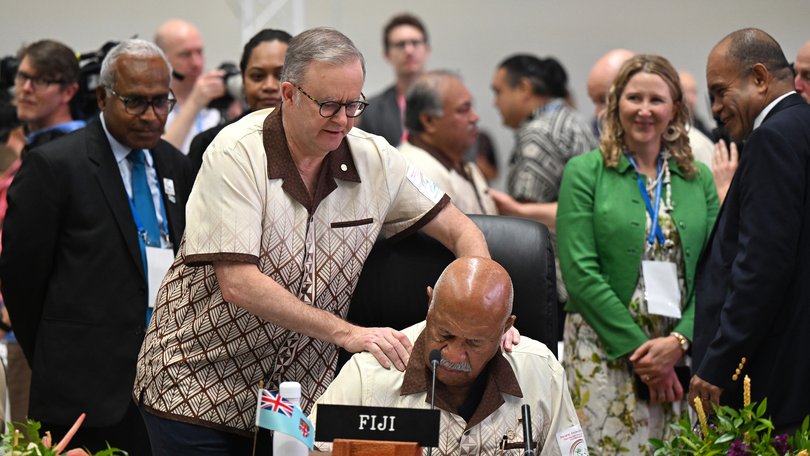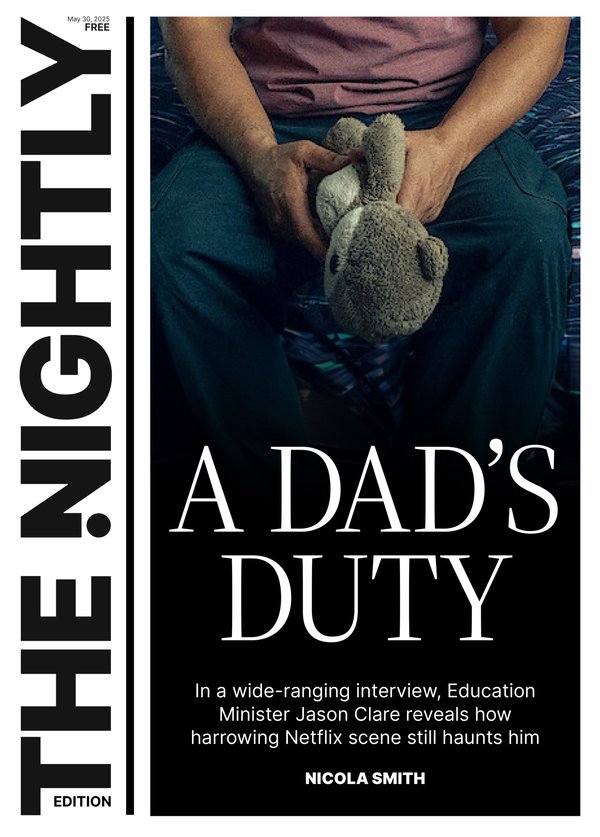Prime Minister Anthony Albanese gets Pacific leaders to back Australia's regional police initiative

Anthony Albanese has secured regional support for his Pacific Policing Initiative, which the Australian prime minister says will strengthen collective peace and security.
Arriving at the Pacific Islands Forum Leaders Meeting in Nuku’alofa on Wednesday morning, Mr Albanese won over delegates quickly enough to make an announcement at lunch.
He appeared with counterparts from Papua New Guinea, Fiji, Tonga and Palau to trumpet the Pacific Policing Initiative (PPI).
Sign up to The Nightly's newsletters.
Get the first look at the digital newspaper, curated daily stories and breaking headlines delivered to your inbox.
By continuing you agree to our Terms and Privacy Policy.“This is a Pacific-led initiative, that’s very important,” Mr Albanese said.
“This is something that has arisen from the Pacific family to look after the Pacific family ourselves, our Pacific neighbours stand with each other, and we help each other in times of need.”
The PPI has three elements: police training “centres of excellence” in the Pacific, a multi-country police force ready to deploy across the region, and a Brisbane-based coordination hub.
Australia will spend $400 million over five years on the PPI, including building as many as four of the centres of excellence, one of which will be in Papua New Guinea.
“The security of the Pacific is the shared responsibility of the Pacific region and this initiative benefits each of our nations,” Mr Albanese said.
The PPI is not without its critics, including some at the PIF summit.
The Melanesian Spearhead Group (MSG) — comprised of Papua New Guinea, Fiji, Solomon Islands, Vanuatu and New Caledonia — provided pushback after their meeting on Tuesday.
MSG director-general Leonard Louma called it worthy but “cryptic”, suggesting it was part of a wider security play by Canberra.
“This PPI must be genuinely framed to fit our purposes and not conveniently developed as part of the geo-strategic denial security doctrine of our big partners,” he said, according to a communique.
An official, speaking privately, said all PIF members were invited to speak on the PPI during Wednesday’s meeting - and none offered criticism.
PIF’s Tongan chair Hu’akavameiliku Siaosi Sovaleni then passed the motion with full support, before Mr Albanese spoke in thanks.
The initiative is widely seen by analysts as a rebuke to China’s efforts to expand its own policing and security footprint in the region.
Australian officials were at pains to say many of the details were yet to be decided and would only come after consultation.
New Zealand Prime Minister Chris Luxon said his country would participate and potentially also help fund the PPI.
“Think about narcotics and the flow of crime throughout the region, and actually having a Pacific solution to a Pacific challenge ... is really, really important,” he said.
An integrated regional policing capability was first discussed at the Pacific Islands Chiefs of Police meeting last year.
Mr Albanese missed the opening two days of the summit but brought tremendous energy when he arrived at the Tonga High School stadium for the plenary.
At one point, he snuck up on Sitiveni Rabuka and surprised him with a shoulder massage, saying “you’re under arrest!”
The Fiji prime minister met his jocularity with a smile and a thumbs up, later adding his voice in support of the PPI.
“It’s our responsibility to develop our own policing initiative and in this case we’ve come together to establish this concept and co-operate towards it. I’m sure it will succeed,” he said.
Mr Albanese’s efforts to meet with other leaders informally even held up the start of the morning’s proceedings.
On Wednesday night, leaders will enjoy a private dinner with their spouses before heading to the northern island of Vava’u for a leaders retreat on Thursday.
The closed door meeting is a piece of diplomacy unique to PIF, with only the 18 member representatives and the secretary general allowed in the room.
Leaders spend all day thrashing out issues, which this year will include the future of New Caledonia, a selection process for the 2026 PIF chair - likely to be Palau - and climate change.
Tuvalu is taking a proposal to take a firmer stance on sea level rise, claiming in-principle support from Australia to do so.
